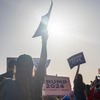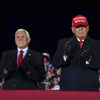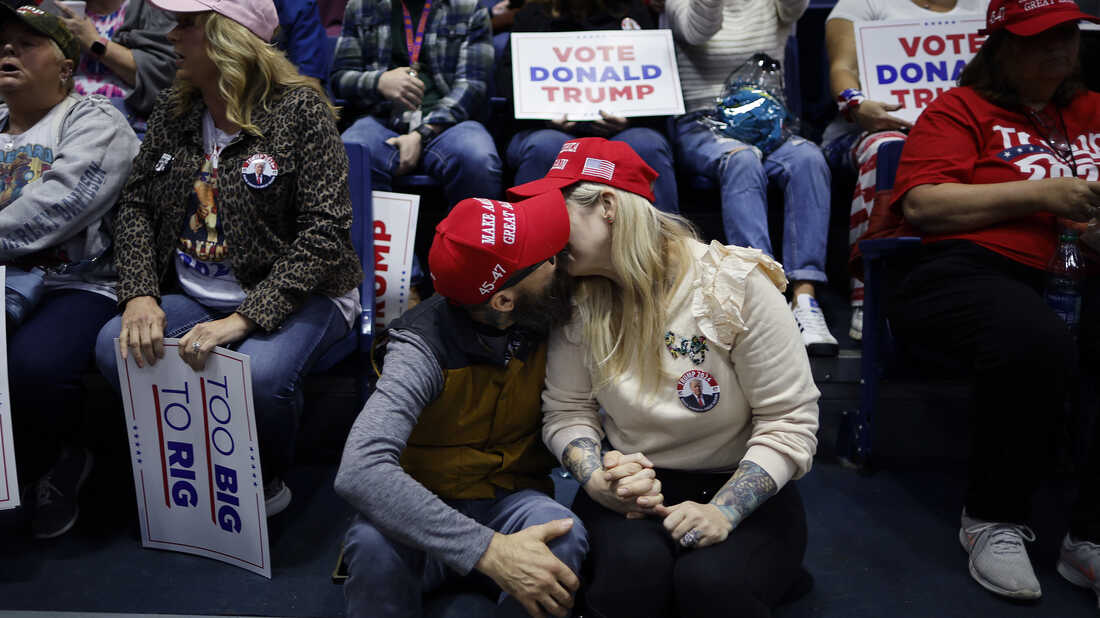
A couple kisses while waiting for the start of a campaign rally with former President Donald Trump on March 9 in Rome, Ga.
Chip Somodevilla/Getty Images
hide caption
toggle caption
Chip Somodevilla/Getty Images
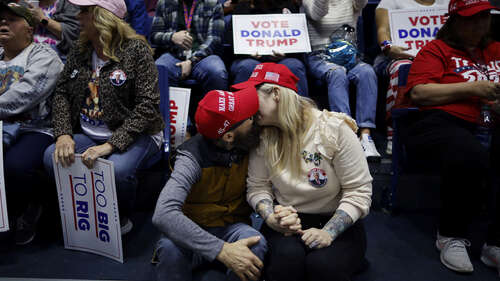
A couple kisses while waiting for the start of a campaign rally with former President Donald Trump on March 9 in Rome, Ga.
Chip Somodevilla/Getty Images
At 6:30 a.m. it was still dark in Rome, Ga. But people had been lined up for a long time already, still nearly 12 hours before Trump was set to take the stage at another of his rallies.
Some had waited all night amid the crowd-control gates, in the bottom level of a downtown parking garage. At the very front of the line, Sharon Anderson waited under a blanket on a camp chair.
She told me this was her 50th rally. Why does she attend so many?
“I want to show my support for the best president in the history of this nation,” she explained.
Anderson and some friends were all wearing tops styled to look like baseball shirts, with a big “47” on the back (for Trump’s quest to be the 47th president) and “FRONT ROW JOES” on the front. Those “Joes” are a team of Trump superfans who get right up front at rallies.
I asked Anderson how she would describe a Trump rally to someone who has never been to one.
“Oh, it’s very uplifting, encouraging, exciting,” she said. “You just can’t describe it verbally.”
Many Americans won’t share her experience — or her view — and will instead witness Trump events through viral clips of his at times violent, anti-democratic rhetoric — for example, his recent dehumanizing language about migrants and comments about a “bloodbath” should Joe Biden win a second term.
And that’s important. But nine years in, these surreal events say so much more about the continued Trump phenomenon.
A Trump rally has the feel of an all-day pep rally mixed with a megachurch service — except with Trumpism as the religion. The rallies are places where a movement largely defined by grievance can be together, away from opponents — not to mention assertions that Trump lies and is harmful to democracy.
They are places to see that for many Americans, Trumpism isn’t just about politics; it’s a core part of their identities.
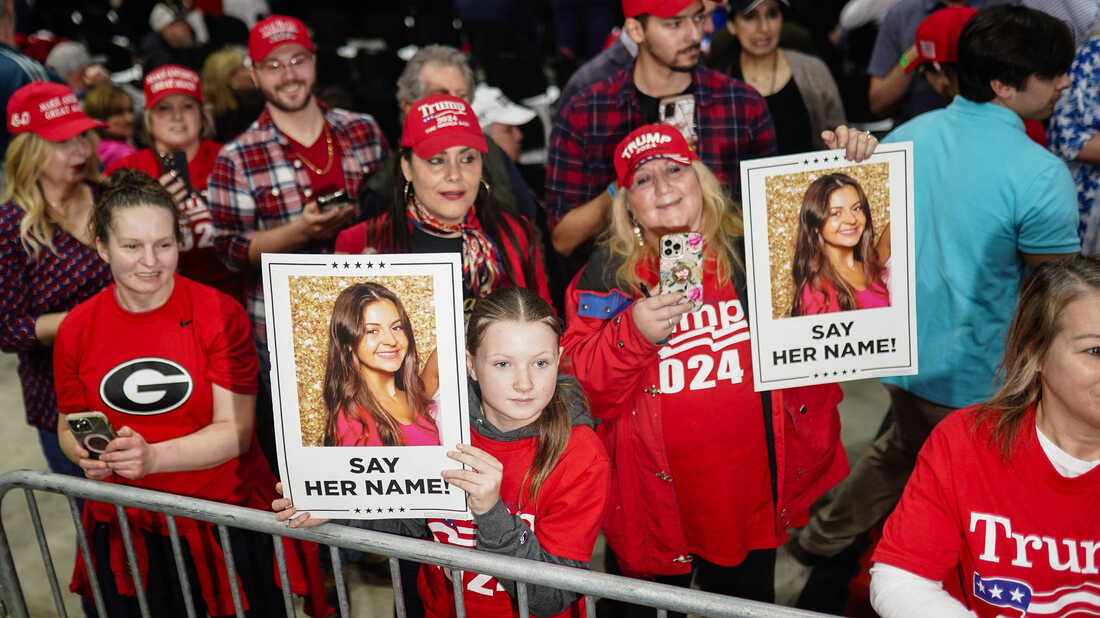
Trump hold images of Laken Riley before he speaks at a rally in Rome, Ga., on March 9.
Elijah Nouvelage/AFP via Getty Images
hide caption
toggle caption
Elijah Nouvelage/AFP via Getty Images
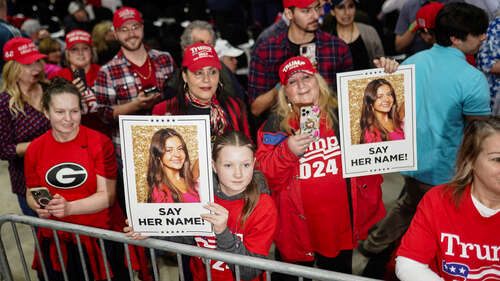
Trump hold images of Laken Riley before he speaks at a rally in Rome, Ga., on March 9.
Elijah Nouvelage/AFP via Getty Images
Families, fandoms, and ‘FJB’
Not far away from Sharon — maybe 20th in line — Lauren Tucker waited. She and her mother traded off holding their place in line overnight. This would be her first rally.
“Everybody here, all the people that were in line before us, they have been so amazing all night long. And they told us exactly what to expect. They helped us get our little buttons and they’ve just been wonderful,” Tucker exclaimed. “It’s almost like a little family.”
Tucker is the mother of six, and her 6-year-old son played on a tablet next to her.
“It was very important for me to have my kids be here because this is something that, A, they’re going to remember, and, B, this is going to be talked about for years,” she said. “For the next hundred years, this is going to be talked about. And my kids will be able to say, ‘Hey, I was there. My mom took me to that. I saw that man.'”
Tucker was wearing red white and blue eyeshadow and an American flag cowboy hat.
And this is a hallmark of Trump rallies: people dress up for them in a way they don’t for other politicians.
Merch sellers like Amber Johnson add to a growing sea of Trumpwear. Johnson is a Trump supporter herself — she calls herself a “Republican Mississippi hippie” — and compares the rallies to rock concerts. She speaks from experience.
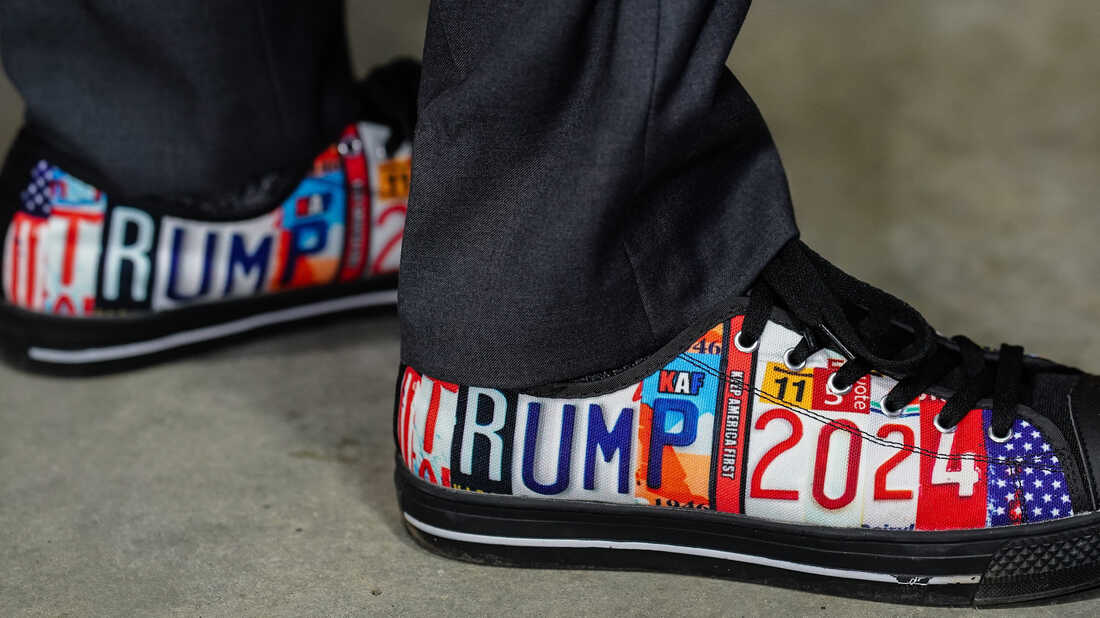
The merch at a Trump rally varies widely, with people procuring it from street vendors as well as all over the internet.
Elijah Nouvelage/AFP via Getty Images
hide caption
toggle caption
Elijah Nouvelage/AFP via Getty Images
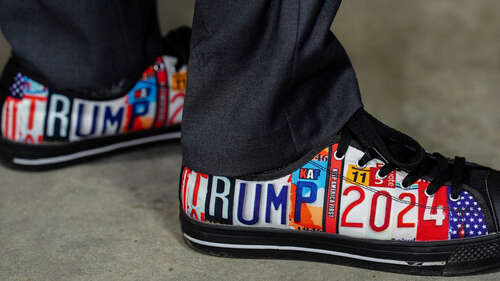
The merch at a Trump rally varies widely, with people procuring it from street vendors as well as all over the internet.
Elijah Nouvelage/AFP via Getty Images
“It’s kind of the same vibe. So I followed Dead & Company and Phish around all summer, and now I’m out here doing the same thing, but selling political merchandise,” she said with a laugh.
And this is one way to understand what makes Trump such a singular phenomenon. His fans aren’t just out to hear a political message; they’re participating in a fandom — a political version of Deadheads or Parrotheads.
Then again, there’s a combativeness at a Trump concert that doesn’t exist at a Phish concert — or at a Biden event, for that matter.
One man nearby sold t-shirts printed with vulgar, sexually explicit statements about Joe Biden, Kamala Harris, and Nancy Pelosi. Among Johnson’s tamer shirts was one that read, “If you don’t like Trump, then you probably won’t like me, and I’m OK with that.”
Another read “FJB,” where the JB stands for Joe Biden and the F is an expletive.
Carli Godfrey is 16 and came with her grandmother, in matching t-shirts. She read the defiant phrase written across their chests: “I’m still a Trump girl. I make no apologies.”
I asked Godfrey what that means – does she think people want her to make apologies? She answered that even in uberconservative northwest Georgia, her politics differ from some of her peers’.
“Being in high school, some people are like, ‘Why are you doing that?'” she said, referring to her Trump fandom. “I mean, a lot of people — this is going to sound really sad, but a lot of people don’t stand for [the] flag. But I do. I always will.”
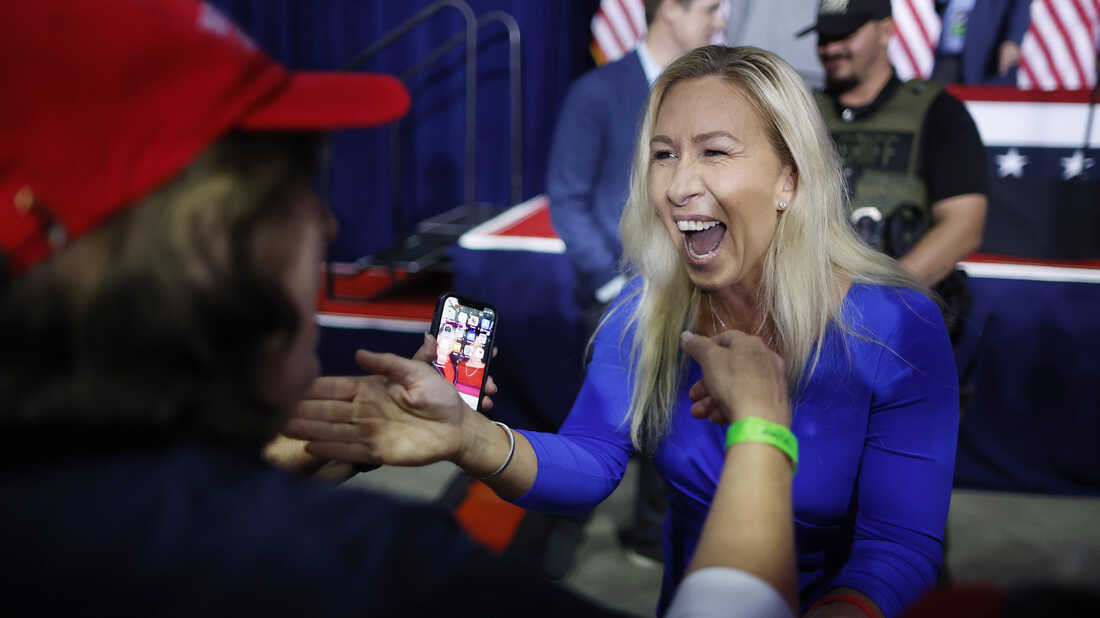
Rep. Marjorie Taylor Greene (R-GA) got a hero’s welcome at the Rome rally, which took place in the heart of her congressional district.
Chip Somodevilla/Getty Images
hide caption
toggle caption
Chip Somodevilla/Getty Images
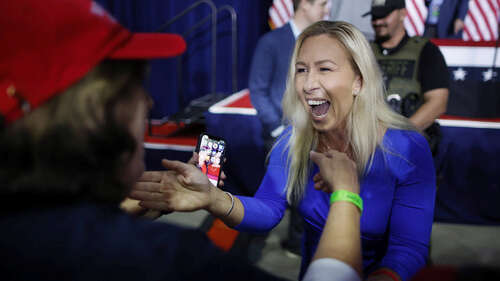
Rep. Marjorie Taylor Greene (R-GA) got a hero’s welcome at the Rome rally, which took place in the heart of her congressional district.
Chip Somodevilla/Getty Images
The grievance of the underdog
The aggressive merch suggests that wearers expect, even relish, opposition. And Trump rallies have perhaps a more confrontational feel than ever, amid his four indictments, and his insistence that he won in 2020. All the voters I asked about 2020 also think Trump won that election. He didn’t.
Midmorning, a few hundred deep into the line, Angie Patrick had just helped a friend wriggle into a new t-shirt reading “God, Guns, and Trump”. Patrick said me she has her own way of fighting for the former president.
“I’m a digital warrior. That means sharing things that perhaps maybe the mainstream media doesn’t necessarily share with the public,” she explained.
She mentioned multiple conspiracy theories she believes in and said she had been kicked off of Twitter 31 times (pre-Elon Musk’s tenure, that is).
To Patrick, Trump is beleaguered and bullied…but also massively powerful. It’s a careful needle he has managed to thread with his followers.
“I think he’s beaten the odds. And I like an underdog,” she said. But she quickly added, “although I don’t think Trump is an underdog. I think he’s definitely the front dog.”
A lot of Trump’s supporters themselves feel like underdogs.
By mid-afternoon, people were taking their seats in the city arena. One of them, college student Zachary Wright, said he feels economically strapped, but also feels marginalized culturally.
“If the economy keeps on getting worse and worse and worse, then how much is it going to cost for my kids to get lunch? And not only that, what’s so frustrating is that the leftist wing focuses so much on minorities that it feels like me as a white man, that I am the minority.”
We versus ‘they’
All afternoon, people queued for concessions and restrooms, chatting with their fellow Trump disciples.
But the mood darkened as Trump’s opening act took the stage — a run of right-wing politicians. Their message was that the Trump movement has an endless string of enemies outside the arena.
Representative Marjorie Taylor Greene, for example, repeatedly referenced a nameless “they.”
“We said build the wall. And they were offended. We said back the blue and they were offended, right?” she added, as the crowd started booing in agreement.
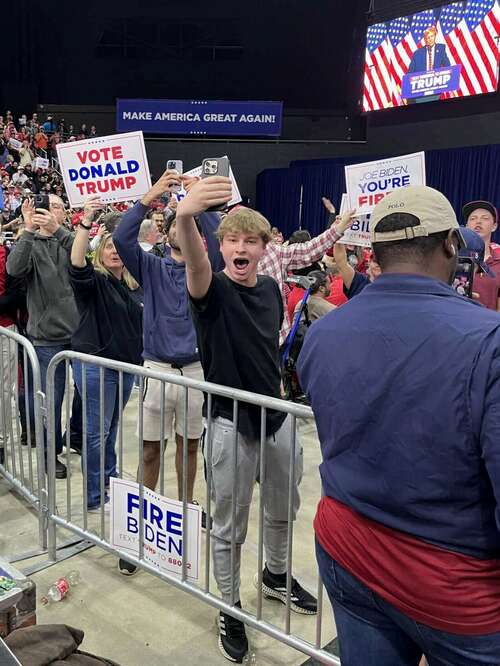
The crowd turns to taunt the press during Trump’s speech in Rome.
Danielle Kurtzleben/NPR
hide caption
toggle caption
Danielle Kurtzleben/NPR
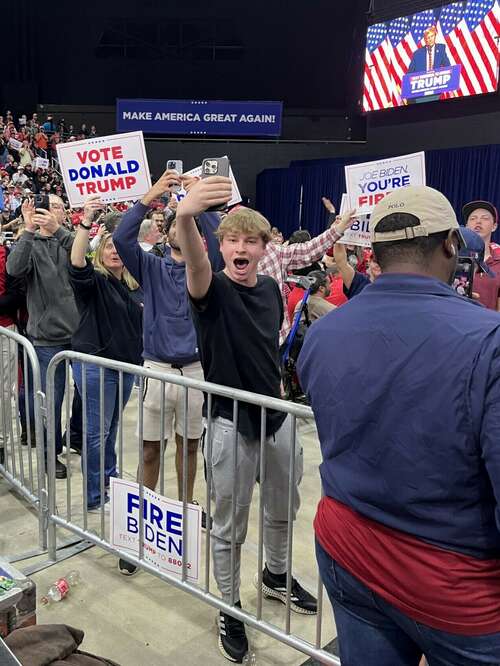
The crowd turns to taunt the press during Trump’s speech in Rome.
Danielle Kurtzleben/NPR
At a Trump rally, even the rioters who attacked the capitol on Jan. 6 are recast as victims of anti-Trump forces.
“Ladies and gentlemen,” an announcer’s deep voice boomed over dramatic music. “Please rise for the horribly and unfairly treated January 6 hostages.”
Lately, Trump takes the stage after a recording of the national anthem sung by those jailed for that attack. While Trump’s indictment for his actions on Jan. 6 looms over his campaign, he also embraces that day. Indeed, he has said he plans to pardon many of the convicted rioters.
Trump started speaking in Rome at around 6:00 p.m., about an hour late. He would remain on stage for nearly 2 hours — long even for a Trump rally speech.
As usual, the demonization of undocumented immigrants was a key focus and drew loud cheers.
“What Joe Biden has done on our border is a crime against humanity and the people of this nation for which he will never be forgiven. We’re going to fix it. We’re going to fix it fast. We’re going to have the largest deportation in history,” he said, to thunderous applause.
Even when his particular wording doesn’t make headlines, Trump’s speeches are full of false — and sometimes strange — rhetoric about migrants.
“They always say suburban housewives, they want something that’s very important: security,” he told the crowd. “They don’t want illegal immigrants coming into our country. They don’t want illegal immigrants knocking on their front door and saying, ‘I’m going to use your kitchen, and I’m going to use your bedroom, and there’s not a damn thing-‘ And that’s the nice ones, okay?”
The speech went beyond immigration though, meandering toward many more of trump’s grievances — yes, against Joe Biden, but also Fulton County, Ga., prosecutor Fani Willis, N.Y. Attorney General Letitia James, Megyn Kelly and Martha Stewart…to name a few.
In addition, he praised Hungarian autocrat Viktor Orban and North Korean dictator Kim Jong Un.
After it all, the evening ended with a familiar benediction: “We will make America great again.”
Just outside, Tynisha Williams said she had a great time. She added — paradoxically — she thinks Trump’s divisiveness will unify the U.S.
“It’s time for the kid gloves to be taken off,” she said. “You need to know the hard truth. And the hard truth is we need to come back together as a country. We need to get this country back together. And we got to unite. We gotta make this country great again, as simple as that.”
It’s not clear how Trump would unite the nation, however. A week later, at another rally, he would say that some undocumented immigrants aren’t people, whipping up another firestorm of controversy.
